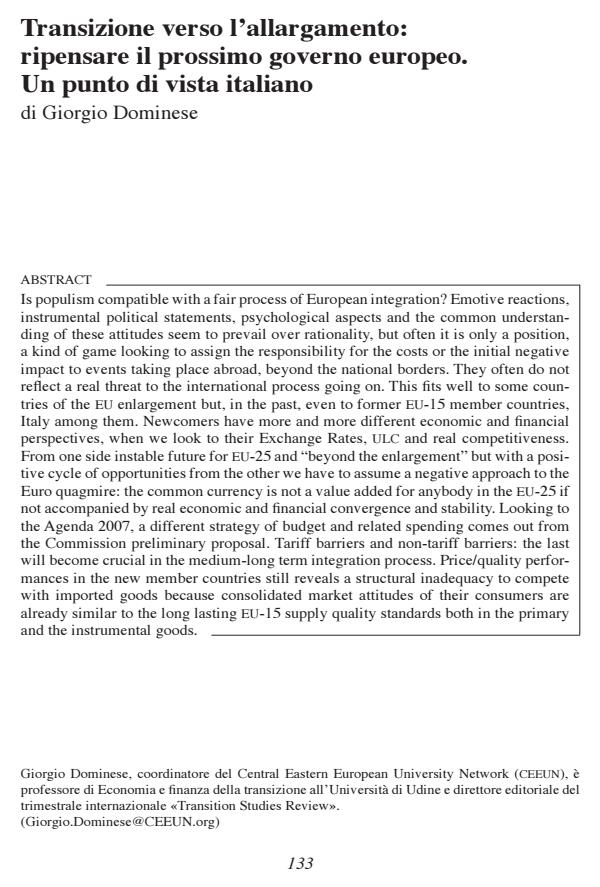Transizione verso l'allargamento: ripensare il prossimo governo europeo. Un punto di vista italiano
Titolo Rivista ECONOMIA PUBBLICA
Autori/Curatori Giorgio Dominese
Anno di pubblicazione 2005 Fascicolo 2005/4
Lingua Italiano Numero pagine 11 P. Dimensione file 509 KB
DOI
Il DOI è il codice a barre della proprietà intellettuale: per saperne di più
clicca qui
Qui sotto puoi vedere in anteprima la prima pagina di questo articolo.
Se questo articolo ti interessa, lo puoi acquistare (e scaricare in formato pdf) seguendo le facili indicazioni per acquistare il download credit. Acquista Download Credits per scaricare questo Articolo in formato PDF

FrancoAngeli è membro della Publishers International Linking Association, Inc (PILA)associazione indipendente e non profit per facilitare (attraverso i servizi tecnologici implementati da CrossRef.org) l’accesso degli studiosi ai contenuti digitali nelle pubblicazioni professionali e scientifiche
Is populism compatible with a fair process of European integration? Emotive reactions, instrumental political statements, psychological aspects and the common understanding of these attitudes seem to prevail over rationality, but often it is only a position, a kind of game looking to assign the responsibility for the costs or the initial negative impact to events taking place abroad, beyond the national borders. They often do not reflect a real threat to the international process going on. This fits well to some countries of the EU enlargement but, in the past, even to former EU-15 member countries, Italy among them. Newcomers have more and more different economic and financial perspectives, when we look to their Exchange Rates, ULC and real competitiveness. From one side instable future for EU-25 and beyond the enlargement but with a positive cycle of opportunities from the other we have to assume a negative approach to the Euro quagmire: the common currency is not a value added for anybody in the EU-25 if not accompanied by real economic and financial convergence and stability. Looking to the Agenda 2007, a different strategy of budget and related spending comes out from the Commission preliminary proposal. Tariff barriers and non-tariff barriers: the last will become crucial in the medium-long term integration process. Price/quality performances in the new member countries still reveals a structural inadequacy to compete with imported goods because consolidated market attitudes of their consumers are already similar to the long lasting EU-15 supply quality standards both in the primary and the instrumental goods.
Giorgio Dominese, Transizione verso l'allargamento: ripensare il prossimo governo europeo. Un punto di vista italiano in "ECONOMIA PUBBLICA " 4/2005, pp , DOI: